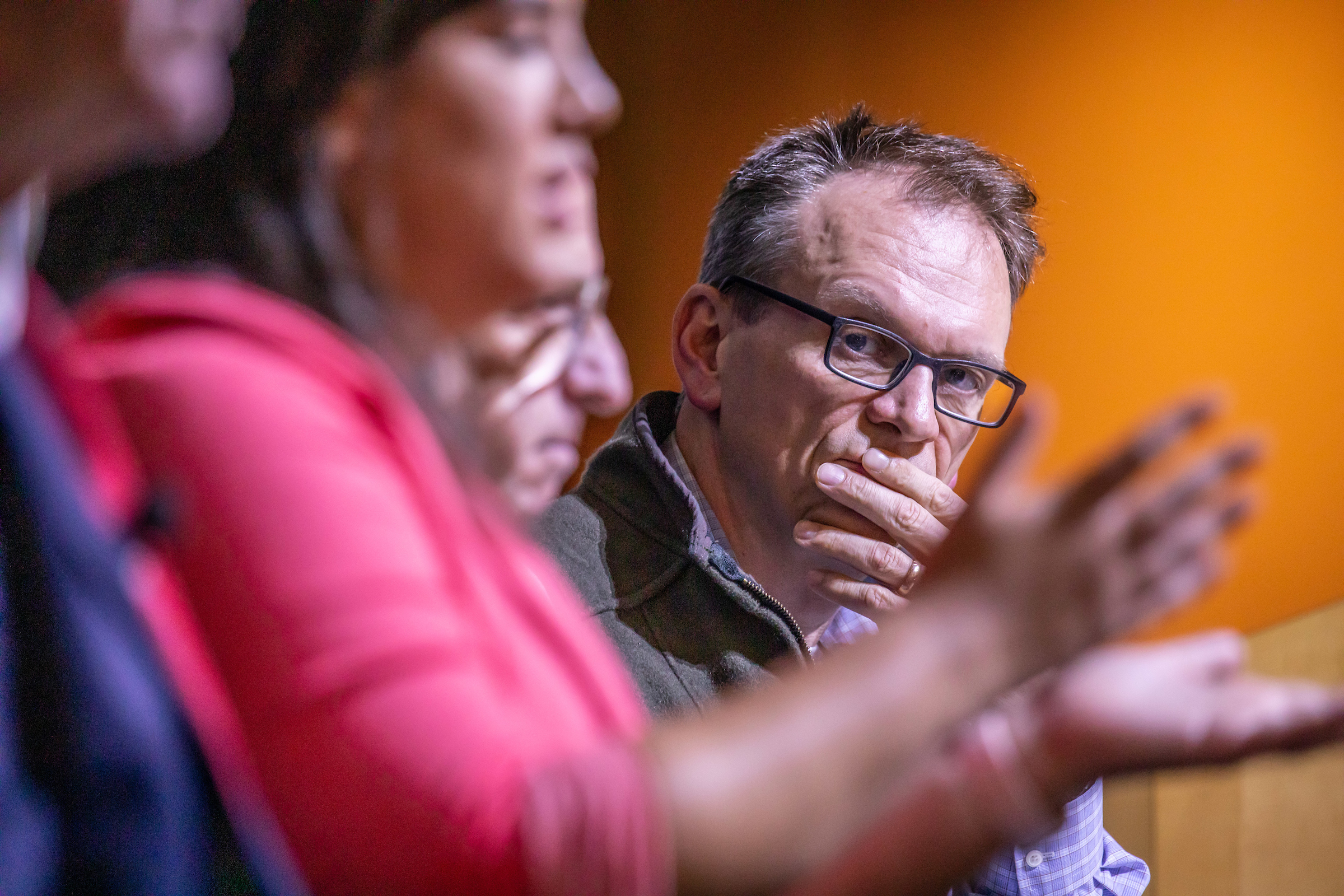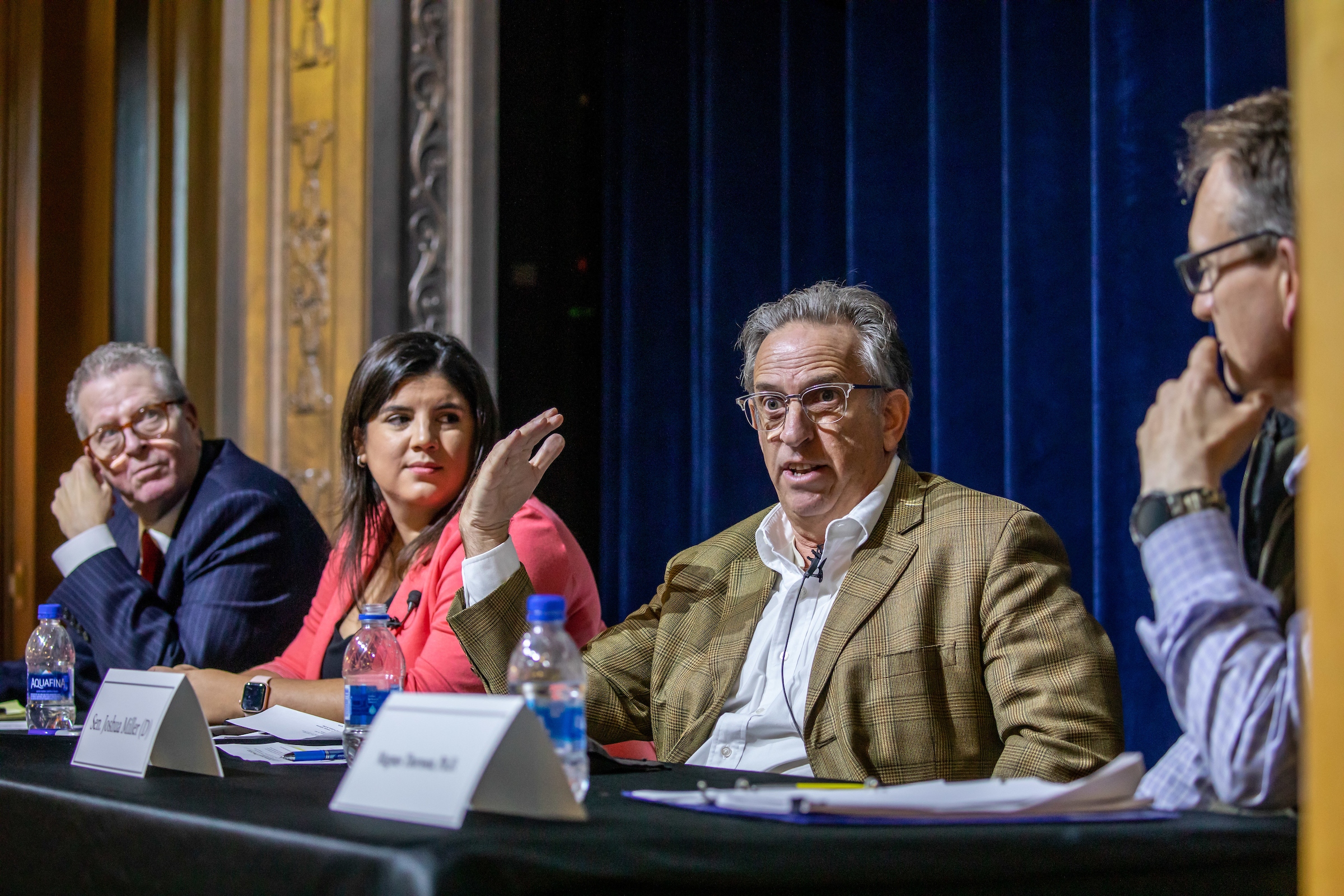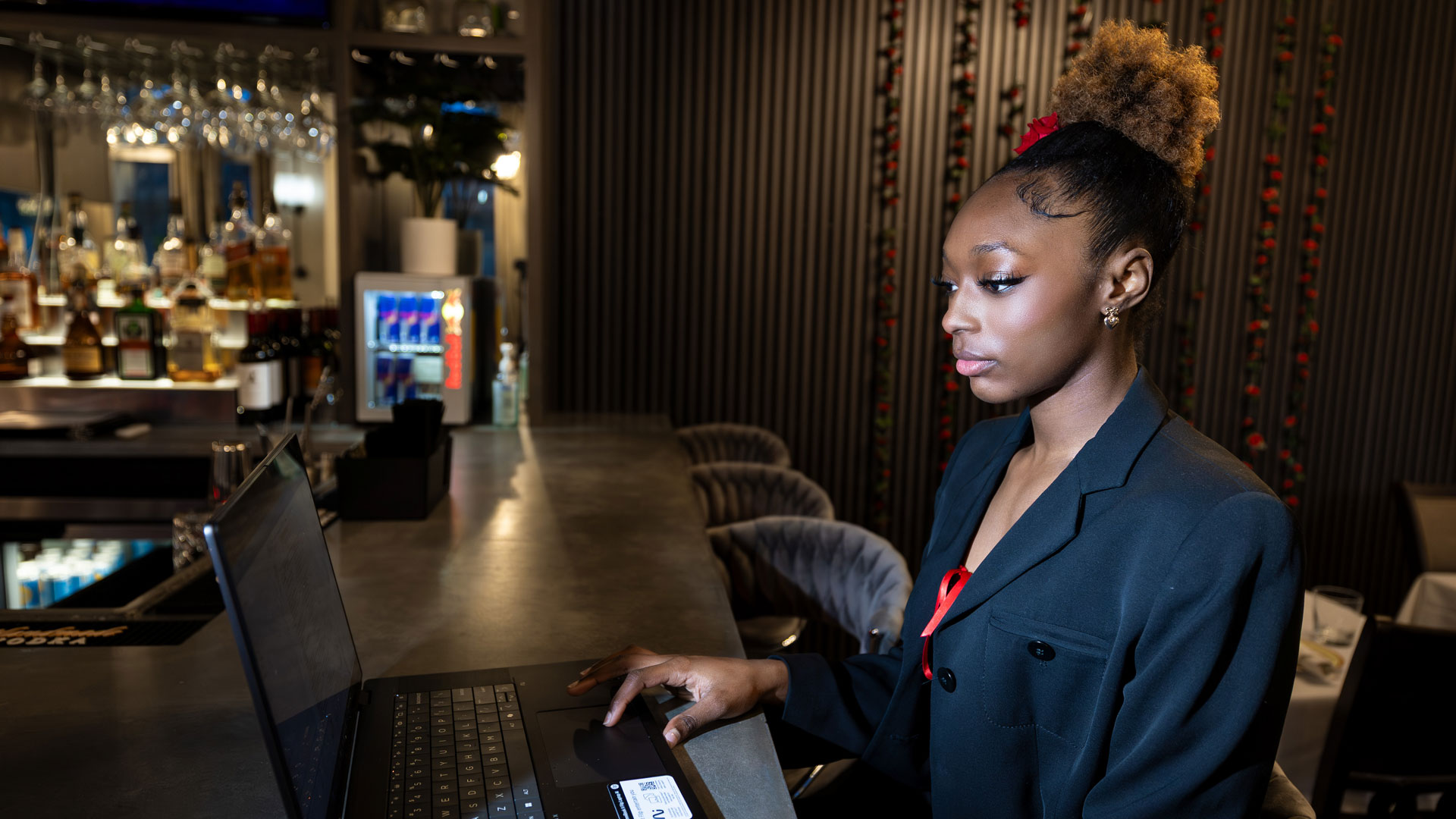From Stigma to Esteem: The Race to Legalize Cannabis
July 2025 Update: Cannabis Entrepreneurship is no longer being offered as a major, but is available as a business-focused minor, Cannabis Management.
From clothing and paper to sails and rope, everyday products once contained cannabis before its classification as an illicit substance at the start of World War I. Today Americans are rediscovering the many practical purposes of cannabis, which has budding businesses and investors seeing green.
This summarizes “Cannabis and the Making of American Society,” the fall edition of the university’s Media and Politics Café series. The event, moderated by Professor Magnus Thorsson, Ph.D., ’93, included panelists:
- Joshua Miller (D), District 28 (Providence/Cranston), Rhode Island State Senate
- Steph Machado, a reporter for WPRI 12 News
- Lou Pulner, J.D., a prosecutor for the town of Barrington who specializes in criminal culpability and liability in cannabis possession
The panel helps launch JWU’s new Cannabis Entrepreneurship program, the first bachelor’s degree program integrating cannabis science and business entrepreneurship in the Northeast. Students explore the foundation of entrepreneurship from plant cultivation to cannabis product retail and are poised to join an industry that offers hundreds of thousands of well-paying jobs.
The university’s program, offered through the College of Business, is unique in that students can explore a plethora of related topics through the combined expertise of JWU’s colleges. These include
- plant biology and the injustices of the past century’s cannabis trade from the John Hazen White College of Arts & Sciences
- cannabis medicinal value and impact on public health through the College of Health & Wellness
- cannabis-friendly services and accommodations from the College of Hospitality Management
- cannabis-infused food and beverages from the College of Food Innovation & Technology
By the time the program’s first cohort graduates in 2025, the industry is expected to exceed $40 billion in sales — and $100 billion before the end of the decade.
“I’m finding it harder and harder to find people who are against marijuana legalization.”

Cannabis Legalization Benefits
Cannabis has contributed to society for centuries. Many early U.S. settlers grew hemp for textiles, food and farm operations. Hemp and cannabis originate from the same plant, with hemp containing 0.3% THC while cannabis contains more than 0.3%.
Thorsson presents five reasons to support the full legalization of cannabis:
- Cannabis can help deter climate change by extracting carbon dioxide from the air.
- Hemp is used to produce bioplastics — a durable, lightweight, biodegradable material that can replace the petrochemical plastics currently polluting the environment.
- Its reputation as a gateway drug has been disproven; cannabis is often prescribed to treat addiction to stronger illegal substances by combating cravings, pain and withdrawal.
- According to the CDC, opioid overdoses caused 49,000 deaths in 2019 while alcohol contributed to the demise of 95,000 Americans. But there is only “limited evidence for any deaths caused by recreational cannabis,” Thorsson says. His statement does not imply that cannabis is harmless, but efforts to research its effects have been restricted due to its narcotic classification. Commissions researching the impact of cannabis and its possible uses in other disciplines are needed, he adds.
- Full legalization can remedy unjust arrests and incarcerations and provide a boost to communities hit hard by America’s century-old war on drugs — a war that began when President Woodrow Wilson signed the Harrison Narcotics Tax Act into law in 1914, the same year that JWU founded.
The act targeted Chinese, Black and Hispanic migrants, and is credited as one of the reasons why Hispanics (17% of the U.S. population) and Blacks (12% of the U.S. population) comprise two-thirds of the prison community. Thorsson estimates that each prisoner loses $250,000 in lifetime earnings, creating a heavy burden on the most vulnerable while exacerbating lifelong poverty.
Miller adds two more benefits to Thorsson’s list: “The advantage of a regulated program is investing in [substance abuse] prevention and education as well as testing to ensure a quality crop. It’s far more dangerous in a non-regulated market.”

Rhode Island Closer to Full Legalization
Rhode Island has a well-established medical marijuana industry with 70 businesses licensed, however, only three medical dispensaries (in Providence, Warwick and Portsmouth) which Machado says are difficult to access without a car. According to Miller, the Senate passed legislation to legalize recreational cannabis in June and since then has been negotiating with the House and the governor to iron out the details of implementation. These details include taxation, governing structure, expungement, number of licenses awarded, a labor agreement, and a social equity component.
“The way Rhode Island did medical marijuana didn’t take social justice into account,” Machado notes. “It’s now a male dominated industry. People of color are affected with barriers to entry, no investors or criminal records.”
Miller is optimistic that a recreational cannabis agreement can be reached by the end of the year and that the marketplace will open quickly: “Retail shops in Massachusetts opened 16 months [after the legalization of recreational cannabis] and I think we can do a couple of months better than that.”
Efforts to increase the number of licensed medical dispensaries to nine are underway, but legal wrangling and delays have occurred. The six new proposed licenses would cover six specific regions of the state and would first be offered to businesses who operate under a co-op structure — particularly those that strive for social equity. Social equity licenses would be funded by cannabis license fees, and business proposal development costs, which usually average $500,000, would be subsidized for lower income individuals. With the proposed tax of 7% for medical marijuana and 20% for recreational, Miller estimates that Rhode Island would net $20 million.
More good news: Supply chain problems that have plagued businesses worldwide have not impacted the state’s cannabis industry; cultivators are renting warehouses with room to expand while medical dispensaries are also growing their own. “At the moment there seems to be a supply that is actively growing,” Machado says. “The demand is there, the supply is there — we just need the details of what a recreational structure is going to be.”
Because cultivators have not reached full capacity, Miller predicts a two-year moratorium on new cultivator and retail licenses until the state can evaluate the effectiveness of the structure. He estimates that the number of licenses will probably be “in the range of the low end of 30-something and the high end of 40-something.”
Pulner expresses concern about licensing distribution in what he describes as “the ‘I know a guy’ state.” Machado acknowledges that the industry’s growing influence and cash reserves increase the potential for corruption, specifically highlighting former Fall River Mayor Jasiel Correia, who extorted bribes from those seeking licenses.
To deter corruption, Miller says that city or town councils will play only a small role in regulation. Communities will also be able to vote in 2022 on whether they’d like to opt out of recreational marijuana sales.
“At the moment there seems to be a supply that is actively growing. The demand is there, the supply is there — we just need the details of what a recreational structure is going to be.”
State Legalization vs. Federal Ban
Even if Rhode Island legalizes recreational marijuana, it remains a federal crime. “The feds have taken a ‘not a crackdown’ and ‘not a hands-off’ approach,” notes Pulner. “Congress needs to do something to recognize states that have legalized it, but I don’t have confidence that will happen.”
The 2013 Cole Memorandum from the U.S. Attorney General’s Office and the Justice Department allows states that have regulated cannabis to continue their commerce only if the cannabis is cultivated, bought and sold within the state. Miller says, “The upside to this is that there are more local entrepreneurs who are cultivators, manufacturers and retailers — and less global and national pressure to take over the industry in any one state.”
With states setting their own guidelines, steps for procuring a medical marijuana card vary widely. In Rhode Island, patients visit their doctor, obtain a doctor’s note, complete an application, and submit all documentation with an application fee. But getting a card from another state is often easier — and Rhode Island recognizes cards from other states. A push to stop this practice failed in the legislator but is being reconsidered. The state is also revisiting drug testing guidelines for employment because, unlike alcohol, cannabis remains in the body for up to three weeks and can keep people from getting employed.
“When people look how to legislate, the worst example is California,” Miller admits. “It’s so disorganized that medical has become recreational.” To effectively regulate, he says Rhode Island needs to narrow the number of licenses given and separate medical marijuana from recreational. These efforts are especially urgent as neighboring states legalize recreational cannabis — which could propel Rhode Island consumer spending habits out of state and result in a loss of tax dollars.

Expungement Debate
In the Rhode Island criminal justice system, those who are caught with less than an ounce of marijuana must pay a $150 fine. Those who are caught with less than an ounce of marijuana three times in 18 months are charged with a misdemeanor and must enter a plea that will not be expunged for at least five years from the end of their sentence. Pulner notes that after legalization of recreational cannabis, a person may file for expungement immediately.
Miller stresses that the process is not that simple: Expungement would only occur for those who carry up to a certain quantity and do not have an arrest record. Court documents don’t always contain the amount of cannabis found — and possession with intent to deliver can still be a felony. Outstanding fines will still need to be paid. Pulner acknowledges that the court system will be unable to distinguish such differences, and Machado worries from a journalist’s perspective that erasing public records — especially regarding someone running for office — can have unintended consequences.
As Rhode Island strives to solve the complexities of legalizing recreational cannabis, a simple truth becomes clear: “I’m finding it harder and harder to find people who are against marijuana legalization,” Machado muses. “Even the police are feeling that way now.” Thorsson agrees, citing that 91% of Americans approve of marijuana for medical or recreational uses.
With such a favorable public opinion, the thriving cannabis industry will continue to gain momentum — and JWU’s Cannabis Entrepreneurship program will remain at its forefront.



